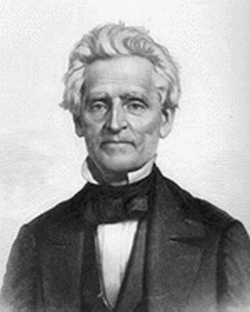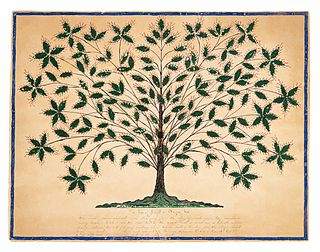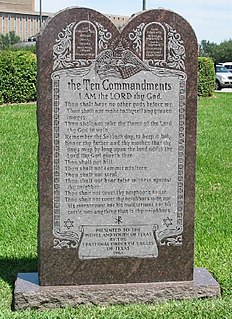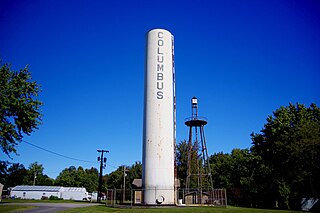
Resurrection is the concept of coming back to life after death. In a number of ancient religions, a dying-and-rising god is a deity which dies and resurrects.

The Second Great Awakening was a Protestant religious revival during the early 19th century in the United States. The movement began around 1790, gained momentum by 1800 and, after 1820, membership rose rapidly among Baptist and Methodist congregations whose preachers led the movement. It was past its peak by the late 1840s. The Second Great Awakening reflected Romanticism characterized by enthusiasm, emotion, and an appeal to the supernatural. It rejected the skeptical rationalism and deism of the Enlightenment.

The Boat of a Million Years is a science fiction novel by American writer Poul Anderson, first published in 1989 and nominated for the Nebula Award for Best Novel that same year. It was also nominated for the Hugo Award for Best Novel and the Prometheus Award in 1990.

Samuel Porter Jones was an American lawyer and businessman from Georgia who became a prominent Methodist revivalist preacher across the Southern United States. In his sermons, he preached that alcohol and idleness were sinful. He was known for his admonition, "Quit Your Meanness."
The term black church or African-American church refers to Protestant churches that currently or historically have ministered to predominantly black congregations in the United States. While some black churches belong to predominantly African-American denominations, such as the African Methodist Episcopal Church (AME), many black churches are members of predominantly white denominations, such as the United Church of Christ.

Pietro Pomponazzi was an Italian philosopher. He is sometimes known by his Latin name, Petrus Pomponatius.
John Timothy McNicholas, O.P. was an Irish-born clergyman of the Roman Catholic Church. A Dominican, he served as Bishop of Duluth (1918-1925) and Archbishop of Cincinnati (1925-1950).

Uriah Smith was a Seventh-day Adventist author, minister, educator, and theologian who is best known as the longest serving editor of the Review and Herald for over 50 years.
Nick Wolfe is a fictional character from the universe of the Highlander franchise, appearing in the spinoff series Highlander: The Raven, portrayed by actor Paul Johansson. He is an Immortal.
The Life of Reason: The Phases of Human Progress is a book published in five volumes from 1905 to 1906, by Spanish-born American philosopher George Santayana (1863–1952). It consists of Reason in Common Sense, Reason in Society, Reason in Religion, Reason in Art, and Reason in Science.

The 1888 Minneapolis General Conference Session was a meeting of the General Conference of Seventh-day Adventists held in Minneapolis, Minnesota, in October 1888. It is regarded as a landmark event in the history of the Seventh-day Adventist Church. Key participants were Alonzo T. Jones and Ellet J. Waggoner, who presented a message on justification supported by Ellen G. White, but resisted by leaders such as G. I. Butler, Uriah Smith and others. The session discussed crucial theological issues such as the meaning of "righteousness by faith", the nature of the Godhead, the relationship between law and grace, and Justification and its relationship to Sanctification.
Immortality is a popular subject in fiction, as it explores humanity's deep-seated fears and comprehension of its own mortality. Immortal beings and species abound in fiction, especially fantasy fiction, and the meaning of "immortal" tends to vary.
New Atheism is a term coined in 2006 by the agnostic journalist Gary Wolf to describe the positions promoted by some atheists of the twenty-first century. This modern-day atheism is advanced by a group of thinkers and writers who advocate the view that superstition, religion and irrationalism should not simply be tolerated but should be countered, criticized, and exposed by rational argument wherever their influence arises in government, education, and politics. According to Richard Ostling, Bertrand Russell, in his 1927 essay Why I Am Not a Christian, put forward similar positions as those espoused by the New Atheists, suggesting that there are no substantive differences between traditional atheism and New Atheism.

"Raccoon" John Smith was an early leader in the Restoration Movement. His father, George Smith was of German ancestry, and may have been born in Germany, while his mother, Rebecca Bowen Smith, was of Welsh and Irish ancestry. He played a critical role uniting the movement led by Thomas and Alexander Campbell with the similar movement led by Barton W. Stone and in spreading the message of the movement over much of Kentucky.

James Caughey was a Methodist minister and evangelist who was active in the United States, England and Canada. An imposing and effective preacher, he conducted highly emotional revival meetings at which many of his audience were converted or reaffirmed their faith. This brought him into some conflict with the more respectable members of the Methodist church in Britain.

Richard McNemar was a Presbyterian-turned-Shaker preacher, revivalist preacher, writer, and a historian of the early nineteenth century. He published the Shakers’ first printed bound book and is considered by historians as the father of Shaker literature. He started the Shaker colonies of Union Village Shaker settlement in Ohio and Shaker village of Pleasant Hill in Kentucky. He is the most prolific composer of Shaker hymns and anthems.

The idea that a common Judeo-Christian ethics or Judeo-Christian values underpins American politics, law and morals has been part of the "American civil religion" since the 1940s. In recent years, the phrase has been associated with American conservatism, but the concept—though not always the exact phrase—has frequently featured in the rhetoric of leaders across the political spectrum, including that of Franklin D. Roosevelt and Lyndon B. Johnson.

The Victory Altar is a new religious movement founded in South Korea in 1981. It teaches that Jesus Christ was a false messiah and that the real Christ is its founder, Cho Hee-Seung (1931–2004), “the Victor Christ.” The movement had some 400,000 members in the early 1990s, but declined after Cho was arrested in 1994 and died in 2004; in 2017, membership was evaluated at around 100,000.



















